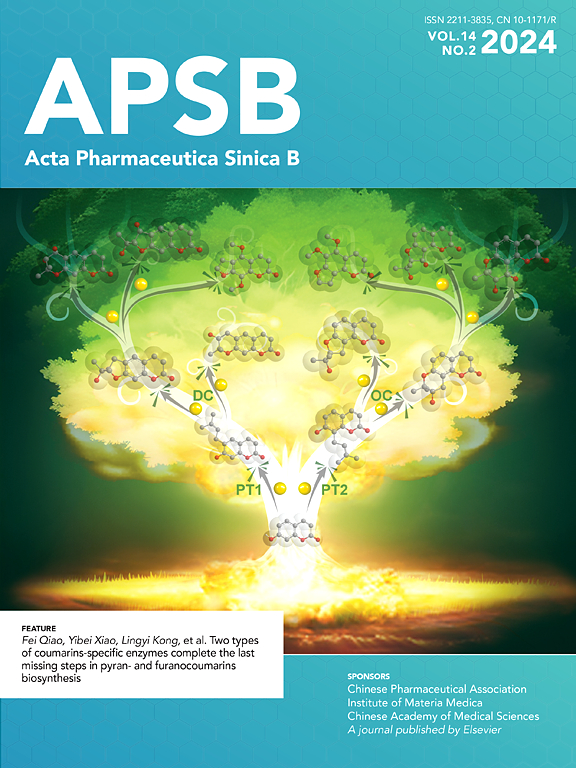Celastrol directly targets LRP1 to inhibit fibroblast-macrophage crosstalk and ameliorates psoriasis progression
IF 14.7
1区 医学
Q1 PHARMACOLOGY & PHARMACY
引用次数: 0
Abstract
Psoriasis is an incurable chronic inflammatory disease that requires new interventions. Here, we found that fibroblasts exacerbate psoriasis progression by promoting macrophage recruitment via CCL2 secretion by single-cell multi-omics analysis. The natural small molecule celastrol was screened to interfere with the secretion of CCL2 by fibroblasts and improve the psoriasis-like symptoms in both murine and cynomolgus monkey models. Mechanistically, celastrol directly bound to the low-density lipoprotein receptor-related protein 1 (LRP1) β-chain and abolished its binding to the transcription factor c-Jun in the nucleus, which in turn inhibited CCL2 production by skin fibroblasts, blocked fibroblast–macrophage crosstalk, and ameliorated psoriasis progression. Notably, fibroblast-specific LRP1 knockout mice exhibited a significant reduction in psoriasis like inflammation. Taken together, from clinical samples and combined with various mouse models, we revealed the pathogenesis of psoriasis from the perspective of fibroblast-macrophage crosstalk, and provided a foundation for LRP1 as a novel potential target for psoriasis treatment.

银屑病是一种无法治愈的慢性炎症性疾病,需要新的干预措施。在这里,我们通过单细胞多组学分析发现,成纤维细胞通过分泌CCL2促进巨噬细胞募集,从而加剧了银屑病的进展。经筛选,天然小分子塞拉斯托能干扰成纤维细胞分泌 CCL2,并改善小鼠和猴模型的银屑病样症状。从机理上讲,芹甾醇可直接与低密度脂蛋白受体相关蛋白1(LRP1)β链结合,并在细胞核中取消其与转录因子c-Jun的结合,从而抑制皮肤成纤维细胞分泌CCL2,阻断成纤维细胞与巨噬细胞之间的串联,改善银屑病的进展。值得注意的是,成纤维细胞特异性 LRP1 基因敲除小鼠的银屑病类炎症明显减少。综上所述,我们从临床样本出发,结合各种小鼠模型,从成纤维细胞-巨噬细胞串联的角度揭示了银屑病的发病机制,为将LRP1作为治疗银屑病的潜在新靶点奠定了基础。
本文章由计算机程序翻译,如有差异,请以英文原文为准。
求助全文
约1分钟内获得全文
求助全文
来源期刊

Acta Pharmaceutica Sinica. B
Pharmacology, Toxicology and Pharmaceutics-General Pharmacology, Toxicology and Pharmaceutics
CiteScore
22.40
自引率
5.50%
发文量
1051
审稿时长
19 weeks
期刊介绍:
The Journal of the Institute of Materia Medica, Chinese Academy of Medical Sciences, and the Chinese Pharmaceutical Association oversees the peer review process for Acta Pharmaceutica Sinica. B (APSB).
Published monthly in English, APSB is dedicated to disseminating significant original research articles, rapid communications, and high-quality reviews that highlight recent advances across various pharmaceutical sciences domains. These encompass pharmacology, pharmaceutics, medicinal chemistry, natural products, pharmacognosy, pharmaceutical analysis, and pharmacokinetics.
A part of the Acta Pharmaceutica Sinica series, established in 1953 and indexed in prominent databases like Chemical Abstracts, Index Medicus, SciFinder Scholar, Biological Abstracts, International Pharmaceutical Abstracts, Cambridge Scientific Abstracts, and Current Bibliography on Science and Technology, APSB is sponsored by the Institute of Materia Medica, Chinese Academy of Medical Sciences, and the Chinese Pharmaceutical Association. Its production and hosting are facilitated by Elsevier B.V. This collaborative effort ensures APSB's commitment to delivering valuable contributions to the pharmaceutical sciences community.
 求助内容:
求助内容: 应助结果提醒方式:
应助结果提醒方式:


